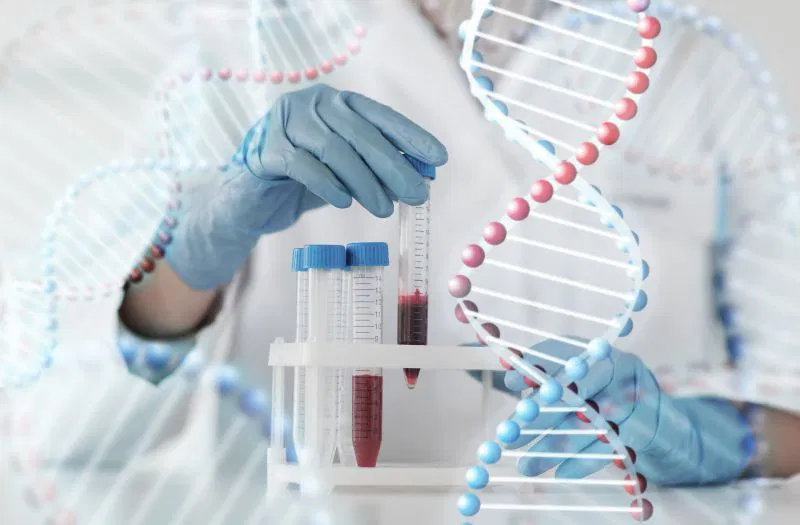Genetic Testing in Warsaw – Where to Get DNA and Prenatal Tests?
Genetic Testing – Discover Your Health Risks and Prenatal Insights
Genetic testing is a modern tool that allows you to understand your individual health predispositions, disease risks, and the proper course of pregnancy. DNA tests and prenatal screenings enable early detection of potential issues, giving you time to make informed decisions and access appropriate care.
At Aurora Medical Clinic, located in the center of Warsaw (ul. Marcina Kasprzaka 7, suite U8), you can undergo comprehensive genetic and prenatal testing. Registration is quick and convenient: online, by phone at +48 884 807 400, or through our social media channels.
We offer a wide range of tests, including:
DNA Genetic Tests – diagnostics of hereditary diseases, analysis of health predispositions, and pharmacogenetic testing.
Prenatal Testing – Harmony, Panorama, and other advanced non-invasive tests to monitor your baby’s development and detect genetic abnormalities.
Specialized Tests for Women and Men – genetic markers, hormonal profiling, and immune system diagnostics.
With state-of-the-art equipment, a convenient central location, and a personalized approach to each patient, genetic testing at Aurora Medical is fast, safe, and reliable. These tests provide peace of mind and empower you to take proactive care of your health and that of your loved ones.
Book Your Genetic Test:
The Complete Guide to Genetic Testing
DNA Analysis and Genetic Testing in Warsaw: A Growing Trend
DNA analyses and genetic testing in Warsaw are gaining increasing popularity, as they not only help diagnose diseases but also predict the risk of developing them. These tests allow individuals to take better care of their own health and that of their family.
Genetic testing can detect mutations that may increase the risk of certain diseases.
As part of women’s health prevention, regular gynecological examinations—including Pap smears, pelvic exams, colposcopy, gynecological ultrasound, and cervical assessments—are crucial for early detection. These exams can identify changes in the cervix, such as cervical polyps, and help plan further treatment and preventive measures.
Abnormal vaginal bleeding is an important warning sign that requires diagnostic evaluation and prompt intervention by a gynecologist.
In this guide, we explain what genetic tests are, the types of DNA analyses available in Warsaw laboratories, the costs of popular prenatal tests such as Harmony, Panorama, and NIFTY Pro, and how to prepare for testing. Various payment options are available, including online payments, prepayment, and installment plans.
Every woman who cares for her health regularly attends gynecological check-ups to detect reproductive organ diseases early and prevent serious health complications. Gynecologists may also recommend genetic testing as part of comprehensive healthcare, enabling more effective diagnostics and preventive care.
Key Information
DNA analyses and genetic tests can reveal predispositions to cancer, metabolic disorders, and hereditary conditions. In Warsaw, prenatal, postnatal, and oncogenetic tests are available, along with comprehensive diagnostic panels.
Prenatal tests such as Harmony, Panorama, and NIFTY Pro provide a safe assessment of the risk of chromosomal abnormalities in the fetus. Other DNA screening tests are also available, such as HPV testing and the EndoRNA genetic test. Results should be reviewed by a doctor to ensure proper interpretation.
Genetic test prices start at several hundred zlotys, while more advanced tests cost around 1800–2000 PLN. Ultrasound prices vary depending on the type of examination. As part of breast cancer prevention, regular breast ultrasounds are recommended for the early detection of changes.
What a Genetic Test Determines
Genetic testing is a modern medical tool that offers broad possibilities for diagnosing, treating, and preventing hereditary diseases. At the core of genetic tests is DNA analysis—the unique biological code that determines our health, appearance, and susceptibility to certain conditions.
Samples for testing are usually collected from blood, saliva, or a cheek swab. In the case of women, samples may also be taken from the cervical or vaginal canal. The collected genetic material is then analyzed in a laboratory, where specialists look for mutations or other changes that may be associated with hereditary diseases.


Genetic analyses involve examining DNA, the unique code that determines our health, appearance, and susceptibility to diseases. These tests allow you to:
Assess the risk of hereditary, metabolic, and cancer-related conditions
Confirm a clinical diagnosis
Choose effective treatment methods
Plan health and family preventive care
A gynecological examination, combined with the results of genetic tests, forms the foundation of women’s health prevention—especially when planning a pregnancy or when changes in the cervix are suspected, including cervical polyps.
Indications for Genetic Testing and Diagnostics
Genetic tests are recommended in cases of:
Family history of cancers (e.g., breast, ovarian, or colorectal cancer)
Suspected hereditary diseases
Pregnancy planning and prenatal testing
Fertility issues and embryo implantation problems
Diagnosis of metabolic or autoimmune disorders
Previous miscarriages that may have a genetic basis

Main Applications of DNA Tests
Tests for Couples Planning a Family
DNA screening tests can determine whether prospective parents are carriers of mutations that could be passed on to their child. This allows for early pregnancy planning and helps reduce the risk of serious hereditary diseases.
Infertility Diagnostics
Infertility can result from mutations in genes responsible for ovarian or sperm function, or embryo implantation. DNA analyses help identify the cause and plan more effective treatments. Additional evaluations, such as endometrial assessment, gynecological ultrasound, and uterine anatomy checks, are performed. The results are professionally assessed by a doctor to identify potential health issues.
Testing Miscarriage Tissue
Chromosomal abnormalities account for 70–80% of miscarriages. Examining miscarriage tissue, often combined with parental karyotype analysis, can determine the cause and estimate the risk of future losses. Medical consultation is required for proper interpretation.
Preimplantation Genetic Testing (PGT)
In vitro procedures allow embryos to be tested before transfer to the uterus (PGT-A, PGT-M). This enables the selection of embryos with the highest chances of a healthy pregnancy.
Carrier Testing and Comprehensive DNA Panels
Modern techniques, including NGS sequencing, can analyze thousands of genes simultaneously. These tests are used for patients with unclear clinical symptoms or a strong family history of genetic conditions.
Cancer Predisposition Testing
Gene analysis, e.g., BRCA1 and BRCA2, helps assess the risk of breast and ovarian cancer. Combined with breast ultrasound, gynecological exams, and regular doctor visits, this allows for effective prevention and early detection of changes.
Intimate Microbiome Testing
Assessing the uterine and sperm microbiome can impact fertility. An abnormal microbiome may hinder fertilization, implantation, and maintaining pregnancy. Urogenital panels, along with tests for Ureaplasma urealyticum and Chlamydia trachomatis, enable timely treatment interventions.
Types of Genetic Tests in Warsaw
Prenatal Testing
Prenatal tests assess the risk of chromosomal abnormalities in the fetus:
Non-invasive maternal blood tests (NIPT) – Harmony, Panorama, NIFTY Pro
Invasive tests – amniocentesis, chorionic villus sampling (CVS), used in specific cases
During prenatal testing, the endometrial thickness is often evaluated, which is important for planning treatment. Prenatal and postnatal tests are frequently complemented by gynecological ultrasound, allowing for a detailed assessment of reproductive organs during gynecological consultations.
Price List of Popular Prenatal Tests
Postnatal Testing
Performed after the child’s birth:
Newborn screening tests
DNA analysis for metabolic and hereditary diseases
Hearing and vision tests
Oncogenetic Testing
These tests analyze genes responsible for cancer predisposition, e.g., BRCA1 and BRCA2. They may be indicated in cases of abnormal vaginal bleeding or other cervical changes.
Gynecological and Prenatal Examinations – When to Consider Them
Regular gynecological exams are the foundation of women’s health prevention, regardless of age or life stage. Systematic gynecological check-ups allow for early detection of abnormalities, such as cervical polyps, changes in the cervix, or other reproductive organ conditions. Early detection enables timely treatment and helps prevent more serious health complications.
It is recommended to have a gynecological examination at least once a year, even if no symptoms are present. During the visit, the doctor may order additional tests, such as Pap smear, breast ultrasound, or cervical canal examination, for a more comprehensive health assessment. Gynecological ultrasound is one of the most important imaging tests, allowing detailed evaluation of reproductive organs and detection of changes not visible during a standard examination.
For women planning a pregnancy or who are already pregnant, prenatal testing is particularly important. Prenatal ultrasound assesses fetal development, detects potential congenital abnormalities, and monitors the progress of pregnancy. In higher-risk situations, such as multiple pregnancies or genetic predispositions, a perinatology consultation is recommended to provide specialist advice and individualized pregnancy management.
If abnormalities are detected during a gynecological exam, the doctor may order a histopathological examination to evaluate tissue samples accurately and make a precise diagnosis. Additionally, for prevention and diagnosis of intimate infections, urogenital panels are increasingly used, testing for pathogens such as Ureaplasma urealyticum and Chlamydia trachomatis. These tests are especially important for women planning a pregnancy or experiencing recurrent infections.
Gynecological visits also allow for contraceptive implant placement, which is an effective and convenient method of preventing unplanned pregnancies. All mentioned examinations and procedures are available according to the clinic’s service pricing, though the final cost is determined individually during a medical consultation.
In summary, regular gynecological and prenatal exams, medical consultations, and modern diagnostic methods are the best way to detect diseases early, practice effective prevention, and maintain health at every life stage. Preventive care is an investment in your health and peace of mind.
How to Choose a Medical Center for Genetic Testing
Choosing the right medical center for genetic testing, especially for gynecological exams or ultrasound, is crucial for patient comfort and safety. Key factors include:
Experience of doctors and availability of modern diagnostic equipment, such as gynecological ultrasound.
Laboratory certification, ensuring high-quality and reliable genetic test results. This allows precise testing and early detection of changes, such as cervical polyps or other abnormalities.
Comprehensive services, including histopathological examinations, biopsies, and modern contraceptive solutions like implants or intrauterine devices. This ensures full diagnostics and treatment in one location.
Medical consultations before and after testing, where doctors review results, answer questions, and recommend individualized care.
Transparent pricing, available on the clinic’s website, with clear information about costs for exams and procedures such as gynecological exams, ultrasounds, biopsies, or contraceptive implants.
Patient reviews, which can provide insight into the center’s reputation and quality of care.
A thoughtful choice of a medical center guarantees professional care, accurate diagnostics, and a sense of safety at every stage of the examination process.

How the Examination Is Conducted
Sample Collection – blood, cheek swab, and in some cases, material from the cervical or vaginal canal.
DNA Analysis in the Laboratory – the waiting time for results is typically 2–14 days.
Medical Consultation – results are interpreted, recommendations are provided, and if necessary, a perinatology consultation is arranged.
Some procedures may require additional interventions, such as histopathological examination, removal of a cervical polyp, or placement of a contraceptive implant or intrauterine device (IUD) during an obstetric visit. If needed, the IUD can also be removed, or a cervical biopsy or removal of other abnormalities can be performed.
For IUD placement, contraceptive implants, or IUD removal, it is necessary to schedule a dedicated appointment in advance. In case of cancellation, please notify the clinic in advance to avoid charges for a missed appointment, in accordance with the current pricing policy.
Genetic Test Results
Positive Result – a pathogenic variant or mutation has been detected, which may lead to disease development or increase the risk.
Negative Result – reduces the risk but does not completely eliminate it, as not all changes can be detected with current knowledge.
Interpretation of results should always be conducted during a consultation with a clinical genetics specialist, taking into account the patient’s individual health situation.
Treatment and Preventive Care After Genetic Testing
Genetic test results, together with gynecological examinations, form a crucial starting point for further treatment and health prevention. If abnormalities are detected, such as cervical polyps or other cervical changes, early detection and timely intervention are essential. Modern diagnostic methods, including gynecological ultrasound and tests like NIFTY, allow precise assessment of health and planning of next steps.
After an ultrasound and medical consultation, a doctor may recommend additional tests such as biopsy, colposcopy, or histopathological examination of cervical tissue. This helps confirm the diagnosis and choose the most effective treatment method. If changes are confirmed, procedures such as removal of a polyp or other abnormalities can be performed, often under local anesthesia with sutures to minimize discomfort.
A medical consultation after receiving test results is essential to discuss an individual treatment and prevention plan. The gynecologist explains the significance of the results and recommends further steps, ranging from pharmacological treatment to procedures and preventive follow-ups. For women planning a pregnancy or who are pregnant, regular fetal monitoring via prenatal ultrasound and, if necessary, a perinatology consultation are particularly important.
As part of preventive care, after genetic and gynecological tests, patients may also consider contraceptive implants or intrauterine devices (IUDs), which provide effective protection against unplanned pregnancy. All procedures are performed following the highest safety standards, with local anesthesia applied when needed for maximum comfort.
A clear pricing list of medical services is an important part of patient care. However, the listed prices do not constitute an official offer under civil law; the final cost is determined individually during the medical consultation, depending on the scope of diagnostics and treatment.
In summary, treatment and preventive care after genetic testing require close collaboration with a doctor, regular follow-ups, and a personalized approach for each patient. Modern diagnostic methods such as ultrasound, NIFTY testing, and histopathological examination allow for effective detection and treatment of abnormalities, ensuring comprehensive care at every stage of life.
FAQ – Genetic Testing
DNA analysis to detect mutations and assess the risk of hereditary, metabolic, and cancer-related diseases.
When planning a family, experiencing fertility issues, after miscarriages, or with a family history of genetic disorders or cancers.
Prenatal (e.g., NIPT), postnatal, oncogenetic, diagnostic, and carrier mutation tests.
No – usually only blood or a cheek swab is collected; invasive prenatal tests are performed only in justified cases.
From a few days up to about 2 weeks, depending on the type of test.
-Positive – a mutation or increased risk has been detected.
-Negative – reduces the risk but does not completely eliminate it.
Yes – they allow the doctor to tailor individual treatment, monitor disease risks, and plan preventive care.
